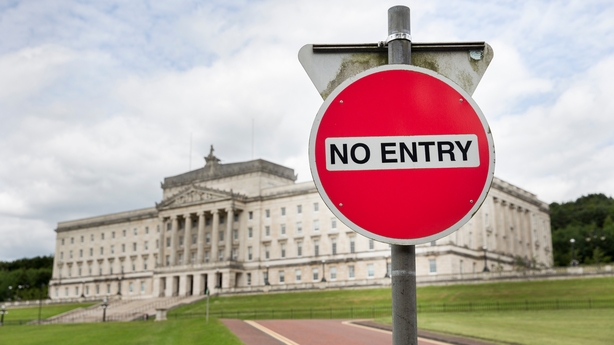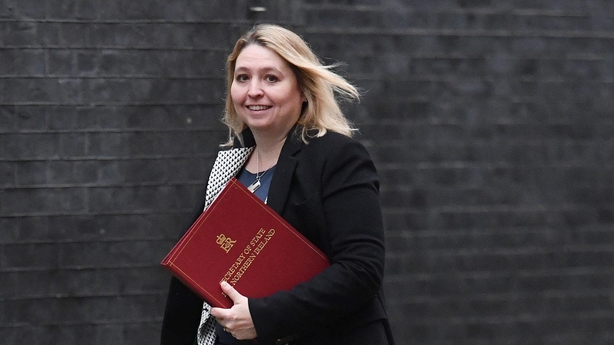One version of Northern Ireland politics is that little changes "in that place".
Orange versus green. Same old, same old. Whataboutery. Flags and marches. A dysfunctional, divided society, with a limitless capacity to generate a sense of grievance.
Such a negative portrait is supported by the undeniable truth that Northern Ireland’s devolved parliament has been closed for business for over a year.

Civil servants are reluctantly keeping the place ticking over with light-touch oversight and the elected members, still on full salary, show no great appetite for finding a formula that would allow them return to their day jobs.
But there is another thesis. An alternative view is that no matter how it tries to resist change, the plates are about to shift in a dramatic, unprecedented way in Northern Ireland.
And the test of the most able survivors will centre on the ability to spot the tidal shifts and catch the waves.
Gerry Adams has been leading Sinn Féin since 1983. He will vacate that position in less than three weeks.
He and the late Martin McGuinness were the dominant forces through the armalite and ballot box years, through to Sinn Féin as a power-sharing Stormont partner for ten years and a growing party of opposition in Dáil Éireann.
Today in Stormont the Sinn Féin team, meeting the DUP, will be led by Michelle O'Neill, replacement of the late Martin McGuinness, and Mary Lou McDonald, Adams’ successor in waiting, up from Dublin for the talks.
Within Sinn Féin there is a new dynamic. A Dublin-born leader based in Dáil Éireann, a Northern faction built around the Adams-McGuinness partnership easing off or retiring and a new, unproven team that will be tested on both sides of the border.
The DUP under Arlene Foster is also on track for a serious bout of unavoidable scrutiny.
In December 2015, she succeeded Peter Robinson as party leader without a contest. But she has spent half the time since, with no place to practice her skills as a parliamentarian or First Minister, because Stormont has been closed.
Her difficulty is she has to take account of several factions:
- her Assembly members
- the DUP's 10 MPs, some of them with a new sense of self-worth because the Tory administration depends on their support
- the DUP’s officer board
- and its wider support base in the various constituencies
If caution continues to dominate her judgement; if she is guided by those who say "leave the shinners out for another while because they were the ones who brought the house down", it is strategy laced with risk.
The DUP influence over the Tory government is a short-term arrangement.
There was too much ability displayed in Ms Foster’s earlier career to suggest that a record of failure as a First Minister followed by a safe seat in The House of Lords would appropriately sum up her career.
But that may be her future, if this bout of negotiations fails.
Today, the efforts to find a way back to power-sharing will begin.

The Northern Secretary, Karen Bradley, is new. She has struggled with some of the nuances but her down-to-earth warmth could be an asset.
Simon Coveney will be keen to mend fences with the DUP and the outburst about the Taoiseach by DUP Westminster MP, Sammy Wilson, should make that easier.
The SDLP, the UUP and the Alliance Party are all keen to get back to work and, in the right circumstances, all three parties would be open to having a role in government.
But the crucial equation will involve the DUP and Sinn Féin. Can they find a way to settle their differences?
Gerry Adams is in the final weeks of his 34-year run as Sinn Féin leader.
He was the one who successfully intervened when negotiations on the devolution of policing and justice hit the buffers.
His comments in recent days about the need to address the toxic atmosphere suggest he is willing to support one final push for a deal.
There were signs of Sinn Féin in deal-making mode last November but the DUP didn’t seem keen to respond.
The Sinn Féin leadership change Ard Fheis is set for 10 February, while 10 April will mark the 20th anniversary of the Good Friday Agreement.
If there is no power-sharing administration in place at that stage, a mothballed Stormont would be stark testimony to political failure.
There is another important date approaching - 21 March - the anniversary of the death of Martin McGuinness.
He more than anyone embraced the principles of power-sharing, tolerance included, in a sustained way.
Like most Sinn Féin Assembly members, he wasn’t a fluent Irish speaker but he had an affection for Irish culture.
His interpretation of respect extended to his behaviour towards political rivals.
Many of those who observed him, close up, for his decade as deputy first minister, believe Martin McGuinness, conscious of Brexit approaching, would not have settled for stalemate.

